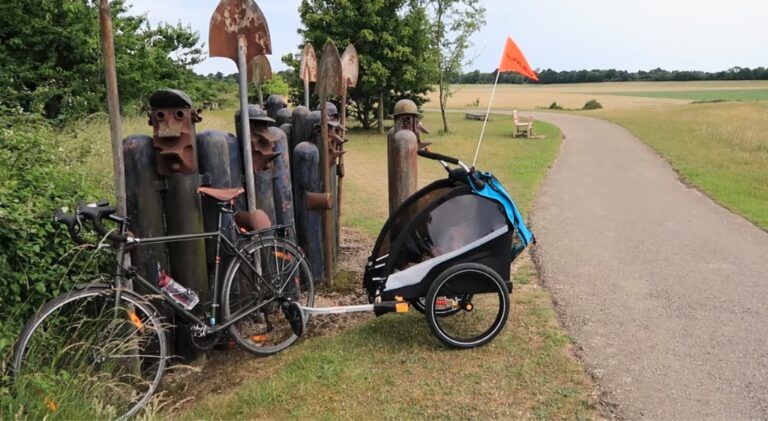Most bike trailers have a weight limit between 100 and 200 pounds. However, there are some models that can accommodate more weight. If you’re planning on carrying a lot of gear or an older child, you’ll want to make sure you choose a trailer with a higher weight limit.
When it comes to bike trailers, weight limit is a critical consideration. After all, you don’t want your trailer to collapse under the weight of your gear or your child. When shopping for a bike trailer, pay close attention to the weight limit. This will help ensure that you choose a trailer that’s right for your needs.
What’s The Maximum Age To Ride In A Bike Trailer?
The maximum age to ride in a bike trailer will vary depending on the specific model and make of the trailer. However, most trailers have a recommended maximum age limit of between 4 and 8 years old.
This is due to the fact that bike trailers are designed for small children and may not be suitable for larger or heavier kids. Additionally, many bike trailers have a weight limit of around 40 pounds, so older kids may simply be too heavy for the trailer.
If you have an older child who is interested in riding in a bike trailer, it’s best to consult with the manufacturer to see if the trailer is rated for your child’s age and weight.
How Tall Is Too Tall To Ride In A Bike Trailer?
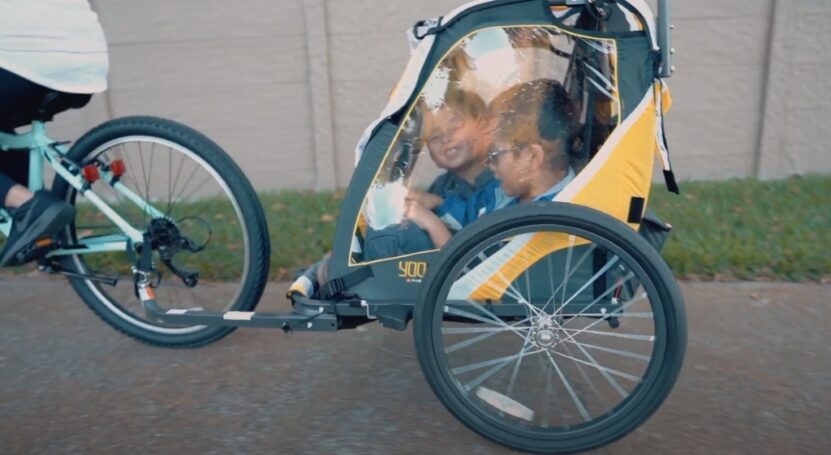
What If A Child Weighs More Than The Recommended Weight Limit? If a child weighs more than the recommended weight limit of the bike trailer, there are a few things that can be done. First, check with the manufacturer to see if they have any recommendations.
If not, then consider getting a trailer with a higher weight limit. Additionally, make sure that the trailer is properly secured to the bike and that the child is safely strapped in. By taking these precautions, you can ensure that your child will be safe and secure while enjoying a bike ride.
Factors Determining The Bike Trailer Weight Limit
There are several factors that can affect the bike trailer weight limit. The type of trailer, the size of the trailer, and the materials used to construct the trailer all play a role in determining how much weight it can safely carry.
The type of bike trailer is one of the most important factors in determining its weight limit. Some trailers are designed for carrying only one or two bicycles, while others are built to transport larger loads.
The size of the trailer also plays a role in its weight limit. Larger trailers can typically carry more weight than smaller ones.
The materials used to construct the trailer can also affect its weight limit. Some materials, such as aluminum, are very strong and can support a great deal of weight. Other materials, such as plastic, are not as strong and may break under the weight of a heavy load.
The bike trailer weight limit is also affected by the type of hitch that is used to attach the trailer to the bicycle. Some hitches are designed to carry more weight than others. The weight limit of the hitch should be taken into account when choosing a trailer.
Finally, the bike trailer weight limit is also affected by the terrain over which the trailer will be used. Smooth, level terrain places less stress on the trailer and its contents than bumpy or hilly terrain. The weight limit of the trailer should be considered when planning a route.
Bike Trailer Type
There are three main types of bike trailers: kid trailers, dog trailers, and cargo trailers. Each has a different weight limit, so be sure to choose the right one for your needs.
- Kid Bike Trailer Weight Limit – Kid trailers have a weight limit of around 100 pounds. That means they can accommodate two small children or one larger child. If you have more than one child, you may want to consider a double trailer.
- Dog Bike Trailer Weight Limit – Dog trailers have a weight limit of around 50 pounds. That means they can accommodate one medium-sized dog or two smaller dogs. If you have more than one dog, you may want to consider a tandem trailer.
- Cargo Bike Trailers – Cargo trailers have a weight limit of around 200 pounds. That means they can accommodate a lot of gear, but they’re not meant for hauling people. If you need to transport more than just yourself and your bike, a cargo trailer is the way to go.
Room For Gear
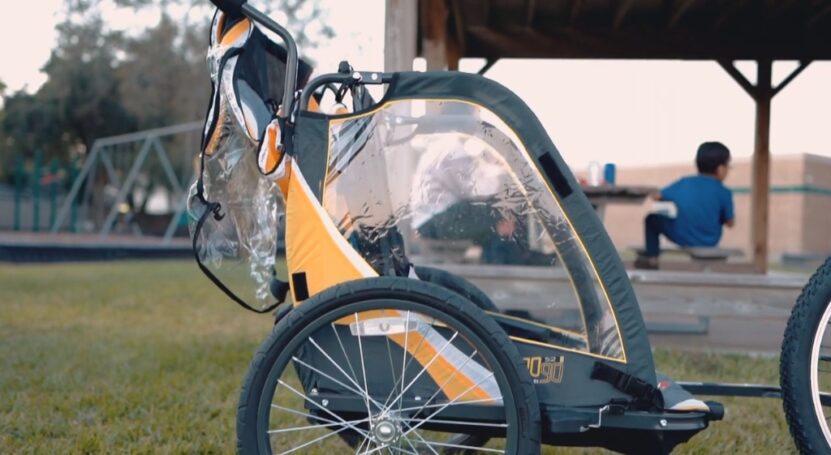
The average bike trailer has enough room to fit one or two people comfortably, as well as a few pieces of gear. If you’re planning on using your bike trailer for camping trips or longer excursions, make sure to pack light and choose a model with plenty of storage space.
Some trailers even come equipped with built-in storage pockets and compartments.
Build Quality
When it comes to build quality, you’ll want to look for a trailer that’s made from sturdy materials like steel or aluminum. The last thing you want is for your trailer to break down while you’re on the road. Also, make sure to check the tires and brakes before each trip to ensure that they’re in good working order.
Bike Trailer Size
When it comes to size, you’ll want to make sure that the trailer is large enough to accommodate all of your gear. If you’re planning on doing a lot of camping, you’ll need a larger trailer. On the other hand, if you’re just using the trailer for occasional trips, a smaller one will suffice.
Seat Capacity
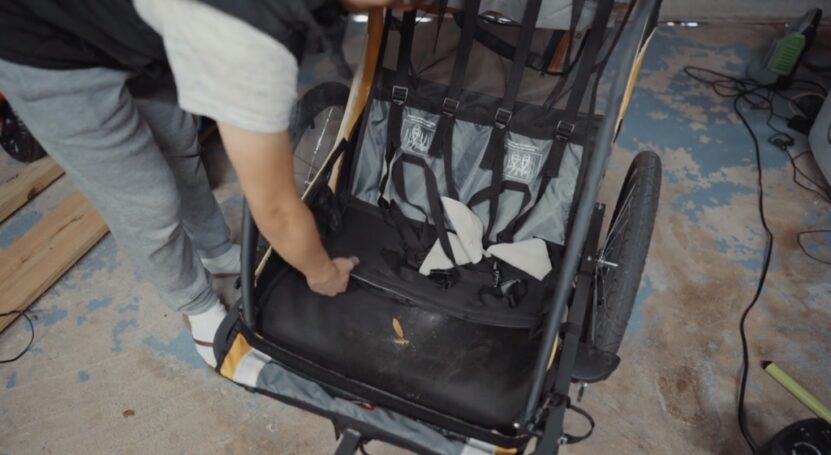
As far as capacity goes, most bike trailers can accommodate up to two children. However, there are some models that can carry more weight, so if you have a larger family or plan on carrying a lot of gear, make sure to choose a trailer that can handle the load.
What Else To Consider Besides The Bike Trailer Weight Limit
- Trailer Type – There are two main types of bike trailers: enclosed and open. Enclosed trailers offer more protection from the elements and can even be used for storage, while open trailers are less expensive and easier to set up.
- Compatibility – Before you purchase a trailer, make sure that it’s compatible with your bike. Some trailers are only compatible with certain types of bikes, so it’s important to do your research before making a purchase.
- Weather Protection – If you’ll be using your trailer in inclement weather, make sure that it has some type of weather protection. This could be anything from a rain cover to an enclosed trailer. Either way, you’ll want to make
- Safety Features – When it comes to safety, there are a few things to consider. First, make sure that the trailer you choose has reflectors or other visibility aids so that drivers can see you on the road. Additionally, you’ll want to make sure that the trailer has a sturdy frame and is properly balanced so that it doesn’t tip over. Finally, you’ll want to make sure that the trailer is equipped with a safety flag so that drivers will be aware of your presence.
- Storage – In terms of storage, you’ll want to choose a trailer that has enough space to store all of your belongings. If you’re planning on using the trailer for long-distance trips, you’ll want to make sure that it has enough space for all of your gear. Additionally, you’ll want to consider the type of storage system that the trailer has. Some trailers have racks that can be used to store luggage, while others have compartments that can be used to store smaller items.
- Comfort – Finally, you’ll want to consider the comfort of the trailer. If you’re planning on using the trailer for long-distance trips, you’ll want to make sure that it’s comfortable enough to sleep in. Additionally, you’ll want to make sure that the trailer has enough space for you to move around comfortably.
How Much Weight Can You Pull On A Bike Trailer?
The amount of weight you can pull on a bike trailer will depend on the specific trailer and how it is designed. Some trailers are made to be able to handle more weight than others.
Generally speaking, however, you should not try to pull more than about 200 pounds on a bike trailer. If you do, you run the risk of damaging the trailer or the bike, and you could also put yourself in danger.
When deciding between a bike trailer or a bicycle seat for your child, it’s crucial to consider factors like the bike trailer weight limit, as explained in the related article.
When Can A Baby Go In A Bike Trailer?
There is no definitive answer to this question, as it depends on a number of factors such as your baby’s age, weight, and development. However, most experts recommend waiting until your baby is at least six months old before taking them out in a bike trailer.
This will give them time to develop the necessary muscles and coordination to sit up and hold their head up for extended periods of time. If you have any concerns about your baby’s ability to safely ride in a bike trailer, be sure to speak with your pediatrician before taking them out on the road.
Can You Attach A Bike Trailer To Any Bike?
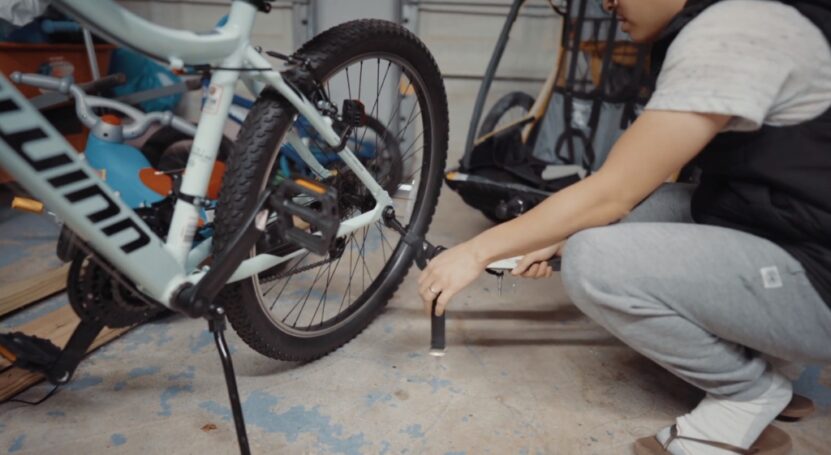
No, you cannot attach a bike trailer to just any bike. The hitch must be compatible with the bike frame, and the tires on the trailer must be the same size as the tires on the bike.
If you have a mountain bike with knobby tires, for example, you will need to get a trailer with knobby tires as well. If you are unsure if your bike is compatible with a particular trailer, consult your bike shop.
Conclusion
In conclusion, the weight limit of a bike trailer is a crucial factor to consider when selecting the right trailer for your needs. It ensures the safety and stability of your trailer while carrying gear or passengers, especially when accommodating older children.
The recommended weight limits for different types of bike trailers, such as kid trailers, dog trailers, and cargo trailers, vary, so it’s essential to choose one that matches your requirements.
Aside from the weight limit, several other factors, including the type of trailer, compatibility with your bike, weather protection, safety features, storage capacity, and comfort, should also be taken into account.
By carefully evaluating these factors, you can make an informed decision when selecting a bike trailer that not only suits your weight requirements but also offers a safe and enjoyable riding experience for you and your loved ones.
Remember that safety should always be a top priority when using a bike trailer, and following the manufacturer’s guidelines and recommendations is key to ensuring a safe and enjoyable ride.

